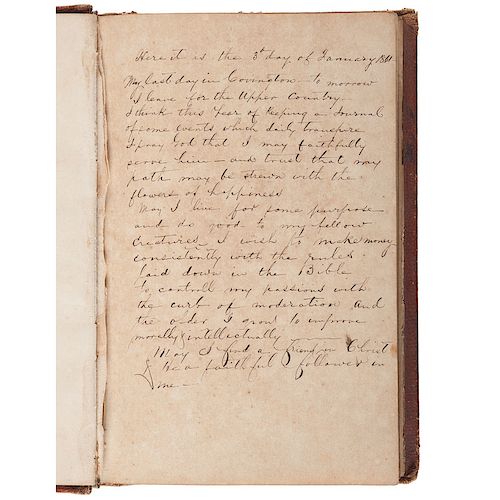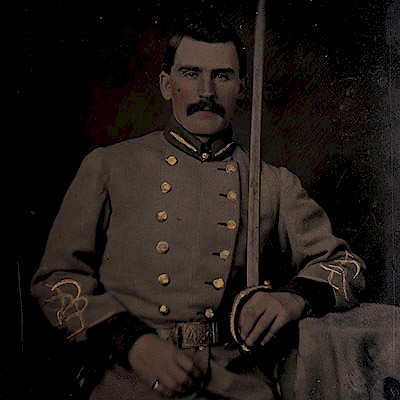Civil War Diary of Georgia Resident Ella Dillard Bates
About Seller
6270 Este Ave.
Cincinnati , OH 45232
United States
With offices in Cincinnati, Cleveland and Denver, Cowan’s holds over 40 auctions each year, with annual sales exceeding $16M. We reach buyers around the globe, and take pride in our reputation for integrity, customer service and great results. A full-service house, Cowan’s Auctions specializes in Am...Read more
Two ways to bid:
- Leave a max absentee bid and the platform will bid on your behalf up to your maximum bid during the live auction.
- Bid live during the auction and your bids will be submitted real-time to the auctioneer.
Bid Increments
| Price | Bid Increment |
|---|---|
| $0 | $25 |
| $500 | $50 |
| $1,000 | $100 |
| $2,000 | $250 |
| $5,000 | $500 |
| $10,000 | $1,000 |
| $20,000 | $2,500 |
| $50,000 | $5,000 |
| $100,000 | $10,000 |
About Auction
Jun 22, 2018
Cowan’s American History: Premier Auction, scheduled for June 22, 2018 is comprised of early photographs, documents, manuscripts, broadsides, flags, and more dating from the Revolutionary War, the Civil War, Late Indian Wars, World War I and II and beyond. Cowan's Auctions dawnie@cowans.com
- Lot Description
Leather bound diary with embossed cover, 5.25 x 7.5 in., 40pp. Written by Ella M. Dillard Bates, the diary spans January through April 1862 with references to domestic life, Civil War events, and slavery.
Ella M. Dillard Bates (ca 1842-1915) was born in Selma, AL, to John and Priscilla Dillard. She was the youngest of five children. She married Gustavus Horace “G.H.” Bates (1831-1891) on June 7, 1860, when she was approximately 18 years old. G.H. Bates was the son of a prominent and wealthy physician, Dr. Horace J. Bates of Covington, GA. Following their 1860 wedding which occurred in Selma, the couple removed to Covington, GA. The couple had one child, Horace Carleton Bates, who was born on May 12, 1861.
The journal opens on January 3, 1862, (Mrs. Bates erroneously writes 1861 but corrects the year on the next page) as Ella prepares to depart her city home in Covington, GA, for the family farm/plantation located approximately 80 miles north near Cartersville, GA. She begins, "My last day in Covington - tomorrow I leave for the Upper Country - I think this year of keeping a journal of some events which daily transpire and pray God that I may faithfully serve him – and trust that my path may be strewn with the flowers of happiness….” Sadly, the diary’s near daily entries do not paint a portrait of a young woman who is happy. Instead, Ella’s journal reflects a woman who is deeply unhappy with her personal life and increasingly anxious about the ongoing Civil War.
Writing from Cartersville, entries in the diary recount domestic activities such as cooking, cleaning, sewing, maintaining her garden, and managing the household. Despite having servants, it appears Ella did participate in maintenance of the household. Ella also writes about family visits, her son Horace, the war, and her husband who she refers to as "Mr. Bates." Ella’s entries on any given topic tend to be brief, yet still provide interesting insight into the domestic life of a well-to-do Southern lady.
The most fascinating content of the diary deals with references to household servants and to her husband Mr. Bates. Ella never uses the word "slave" in her diary, instead she refers to "servants." However, given that the couple resided in the slave-holding state of Georgia, it is reasonable to assume the servants she mentions were in fact slaves. Additionally, while no 1850 or 1860 US Census data could be definitively determined for her husband, the 1850 US Census Slave Schedule for Newton County, GA does reveal that Mr. Bates’ father owned a substantial number of slaves. A total of 39 unnamed slaves are listed on the slave schedule as being owned by Ella’s soon-to-be father-in-law Horace J. Bates. It is therefore very possible that in 1862 Ella’s husband either was a slaveholder himself or utilized slaves owned by his father in his own household. Ella frequently refers to servants/slaves in her journal, as on January 18, 1862, “I think Mary is one of the most impudent little negroes that ever was. I gave her a slap just now and she was mad enough to knock me down.”
Ella’s diary indicates that Mr. Bates travels frequently and often spends full days away from home. Ella’s relationship with her husband appears to be strained, and a closer reading of her journal indicates that one major source of tension in their marriage during this period was a household servant/slave named Emma. Ella knows Emma prior to her arrival in their home. On February 22nd, Ella writes “Mr. Bates says that he is going to Allatoona this morning and send Emma here. I am very sorry as she has got three young children.” Initially, Emma is a welcome addition to the household staff with Ella noting on February 24th that “Emma is washing the dining room floor she is a splendid servant about the house.” Soon, however, the situation deteriorates due to an unstated reason. On February 27th Ella writes, “Mr. Bates got so mad with me last night about Emma. He says he will never forget or forgive me for it as long as he lives. I have been so unhappy this week. Oh how I do wish that I had never been born.” Ella notes the following day her feeling “so jealous over something I heard today it makes me sick.” In the following days Ella waits eagerly for Emma to depart their home, until finally on March 9th she writes “Emma left today how glad I am…”
Mrs. Bates' happiness is short-lived as her husband is making plans to join the Confederate Army. Mrs. Bates references this on numerous occasions along with the grief it brings her to think of him leaving her and her young son. “March 2nd 1862. …Mr. Bates says he will not be with me and his darling little boy much longer- it almost kills me to think of him being gone to the wars.” By mid-April Mrs. Bates knows that his departure is growing nearer as the war moves closer to home. “Ten trains passed today crowded with soldiers they were going to Corinth. Mr. Bates says he will leave as soon as he can get an overseer to take care of his plantation. I shall be so unhappy when he leaves.”
Ella Bates’ journal entries abruptly end on April 15, 1862. A small number of pages at the end of the diary contain what appear to be handwritten notes from Ella Bates including household tasks to attend to and a poem titled “Stone Mountain.”
Military records indicate that a G.H. Bates enlisted on an unknown date as a colonel in the Confederate Army and served in "C" Company with the 10th Georgia Cavalry Battalion. There is little indication that the years following the war were happier ones for the Bates family. Newspaper accounts from 1891 describe the mysterious shooting death of "Colonel Bates" and the attempted suicide of his son Dr. Horace Bates just days later. Following her husband's death in 1891, Ella lived out the remainder of her days in Atlanta.
The diary most likely passed from Ella Bates to her son Horace, and then down to one of his four children and his/her descendants. Horace Bates resided in Waverly, TN, at the time of his death in 1912, and his children settled in the nearby county of Dickson, TN. Penciled initials "J. M. B." and "Waverly Tenn" appear on the interior cover and likely indicate that the diary at one time was in the possession of Jennie Mae (Connelly) Bates (1897-1929) who is now buried in Dickson, TN.
Leather cover has worn edges but diary remains intact and in good overall condition. Diary pages are toned with occasional soil not affecting text. At times the pencil entries are faint though all are still legible.Condition
Eliminate the Hassle of Third-Party Shippers: Let Cowan's Ship Directly To You!
If you'd like a shipping estimate before the auction, contact Cowan's in-house shipping department at shipping@cowans.com or 513.871.1670 x219. - Shipping Info
-
Buyers are required to pay for all packing, shipping and insurance charges. Overseas duty charges are the responsibility of the successful Bidder. Be aware that for larger and/or valuable items, shipping charges can be substantial. - If there is no shipping amount on listed your invoice, you will need to make arrangements to pick up or ship your purchase through an alternative shipping company. Our shipping department can be contacted at 513.871.1670 (ext. 219) or email shipping@cowans.com. - Shipping charges include insurance for your order while in transit. If you have private insurance we will adjust your charge to include only packing and shipping. - Please allow 14 – 21 days after payment to package and ship your purchase as carefully as possible.
-
- Buyer's Premium



 EUR
EUR CAD
CAD AUD
AUD GBP
GBP MXN
MXN HKD
HKD CNY
CNY MYR
MYR SEK
SEK SGD
SGD CHF
CHF THB
THB













